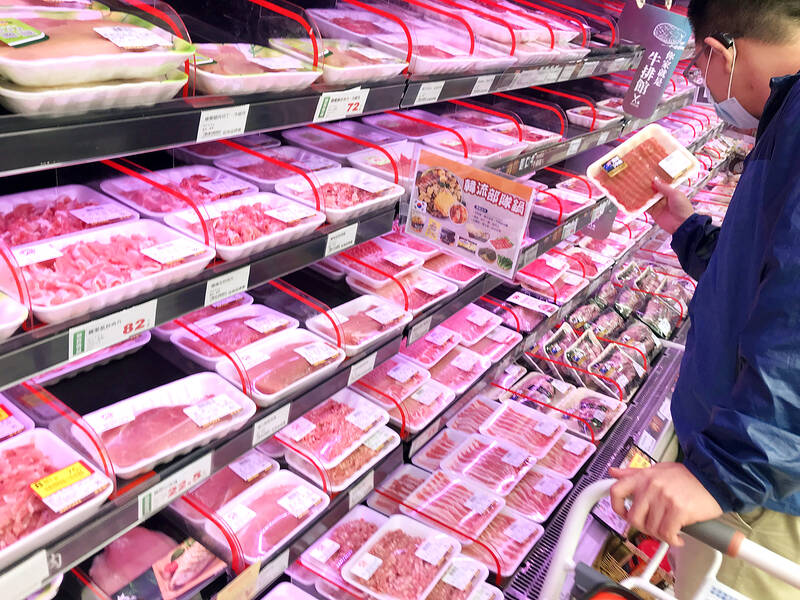The Consumers’ Foundation yesterday opposed lifting a ban on imports of Canadian beef from cattle older than 30 months, as proposed by the Food and Drug Administration (FDA).
The FDA on Thursday released a draft amendment of the Directions of Imported Beef and Beef Products from the United States and Canada (美國及加拿大牛肉及其產品之進口規定), initiating a 30-day period for public input.
The foundation said in a statement that it has only been about a year since the last case of bovine spongiform encephalopathy (BSE), commonly known as mad cow disease, was reported in Canada, and doubts have not yet been addressed.

Photo: CNA
Lifting the ban now would neglect public health and government due diligence, it added.
The foundation said it sternly opposes lifting the ban when people continue to doubt the safety of Canadian beef.
The FDA’s assessment process to be flawed, the foundation said, adding that it would urge people to boycott the products if the ban is lifted.
The Canadian Food Inspection Agency in 2015 confirmed a case of mad cow disease found in Canadian cattle, which was later linked to contaminated feed. Another case was reported in 2021, prompting South Korea, China and the Philippines to suspend Canadian beef imports, it said.
Article 4 of the Act Governing Food Safety and Sanitation (食品安全衛生管理法) states that should manage food safety risk by establishing an assessment and advisory committee comprised of experts specialized in food safety and toxicology, as well as non-governmental organizations.
If the FDA’s advice to lift the ban has undergone a risk assessment, then the meeting minutes and conclusions should be publicly released, the foundation said.
The FDA yesterday said in response that data suggests that Canadian beef from cattle older than 30 months presents negligible health risk.
FDA Director-General Wu Shou-mei (吳秀梅) said the decision was made by following appropriate procedures, including a risk assessment and specialist advisory committee, and that data suggests that only about one in 5 billion people would be subject to any risk from eating BSE-infected cattle.
“It is impossible to have absolutely no risk at all,” she said, adding that people should recognize that the products have achieved “negligible risk status” from international organizations.
Wu said country-of-origin labeling is required for all imported beef and pork, enabling consumers to make their own decisions, although border inspections would not be conducted to avoid debates over discrimination toward a particular country.

“China is preparing to invade Taiwan,” Deputy Minister of Foreign Affairs Francois Wu (吳志中) said in an exclusive interview with British media channel Sky News for a special report titled, “Is Taiwan ready for a Chinese invasion?” the Ministry of Foreign Affairs said today in a statement. The 25-minute-long special report by Helen Ann-Smith released yesterday saw Sky News travel to Penghu, Taoyuan and Taipei to discuss the possibility of a Chinese invasion and how Taiwan is preparing for an attack. The film observed emergency response drills, interviewed baseball fans at the Taipei Dome on their views of US President

The Central Weather Administration (CWA) today issued a "tsunami watch" alert after a magnitude 8.7 earthquake struck off the Kamchatka Peninsula in northeastern Russia earlier in the morning. The quake struck off the east coast of the Kamchatka Peninsula at 7:25am (Taiwan time) at a depth of about 19km, the CWA said, citing figures from the Pacific Tsunami Warning Center. The CWA's Seismological Center said preliminary assessments indicate that a tsunami could reach Taiwan's coastal areas by 1:18pm today. The CWA urged residents along the coast to stay alert and take necessary precautions as waves as high as 1m could hit the southeastern

The National Museum of Taiwan Literature is next month to hold an exhibition in Osaka, Japan, showcasing the rich and unique history of Taiwanese folklore and literature. The exhibition, which is to run from Aug. 10 to Aug. 20 at the city’s Central Public Hall, is part of the “We Taiwan” at Expo 2025 series, highlighting Taiwan’s cultural ties with the international community, National Museum of Taiwan Literature director Chen Ying-fang (陳瑩芳) said. Folklore and literature, among Taiwan’s richest cultural heritages, naturally deserve a central place in the global dialogue, Chen said. Taiwan’s folklore would be immediately apparent at the entrance of the

ECONOMIC BENEFITS: The imports from Belize would replace those from Honduras, whose shrimp exports have dropped 67 percent since cutting ties in 2023 Maintaining ties with Taiwan has economic benefits, Ministry of Foreign Affairs officials said yesterday, citing the approval of frozen whiteleg shrimp imports from Belize by the Food and Drug Administration (FDA) as an example. The FDA on Wednesday approved the tariff-free imports from Belize after the whiteleg shrimp passed the Systematic Inspection of Imported Food, which would continue to boost mutual trade, the ministry said. Taiwan’s annual consumption of whiteleg shrimps stands at 30,000 tonnes, far exceeding domestic production, the ministry said. Taiwan used to fill the gap by importing shrimps from Honduras, but purchases slumped after Tegucigalpa severed diplomatic ties with Taiwan